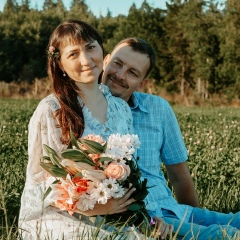Первое воспоминание о Дне Победы почему-то такое: я катаюсь на велосипеде по дорожкам на Ярославовом дворище. Велосипед уже не трёх-, а четырёхколёсный, то есть сзади по бокам есть маленькие колёсики. Утреннее солнце, запах черёмухи и свежесть с реки, перед глазами — трещинки на асфальте. Дома по телевизору идёт концерт Клавдии Шульженко. Я ничего не понимаю, но, по-видимому, песни меня зачаровывают, во всяком случае, я после этого не раз с выражением повторяю, к общему веселью: "Давай закурим, товарищ, по одной! Давай закурим, товарищ мой!"
В тот день отчётливо я больше ничего не помню. Со временем праздник обрёл своё название, содержание, традицию с ожиданием радостной встречи дедушки в костюме с медалями. Я также довольно быстро узнал, что это праздник "со слезами на глазах" — не из песни, а потому что бабушка всегда плакала. Но из того первого дня с песнями Шульженко осталось и сохранилось ощущение какой-то особенной доброты, сердечности и тихого, мирного, безусловного света.
Излюбленной тактикой вермахта в 1941-м были "клещи". Я иду по зелёным улицам Новгорода и думаю о том, что праздник, с которым я вырос, сегодня тоже зажат в клещи: с двух сторон на него наступают две пустоты.
Первая — пустота официальных медиа, которые от имени государства оформляют этот день. Наполняют его "контентом", свеженькими фильмами и песнями, лозунгами, истеричной интонацией. "И у нас остаётся совсем немного времени, чего вы пожелаете нашим телезрителям в этот день?" Всё превращается в шоу, в компьютерную игру: заставки с компьютерной графикой, эмблема 75-летия, составленная из стрелочек наступательных ударов, фраза "Запиши деда в полк" на сайте Бессмертного полка. Пустота поглощает даже простые, базовые слова и формулировки о войне и Победе, если в голосе, произносящем их, больше нет нерва.
Бродский говорил, что эстетическое предшествует этическому, ребёнок тянется к незнакомцу или плачет в его присутствии на основании эстетического переживания. Я понимаю, что меня притянуло в песнях Шульженко, но что может притянуть ребёнка в том, что производится сегодня? Я не говорю о всех медиа. Где-то в регионах делается что-то живое. Но в масштабах страны это тонет в пустоте.
Вторая пустота, как и положено, работает в паре с первой, настигая тех, кого официальные медиа давно оттолкнули. Её приносят другие каналы: издания с хорошим дизайном, посты в фейсбуке. Постепенно нам объясняют, что 9 мая — не праздник, а только день скорби, потому что, как сказал когда-то Павел Дуров, "в этот день Гитлер уступил Сталину право узурпировать СССР". Война советского народа, таким образом, из освободительной превращается в бессмысленную бойню двух тоталитарных систем. Это — пустота невежества. На её месте могли бы быть знания о плане "Ост", могло быть стихотворение "Ты помнишь, Алёша, дороги Смоленщины" или "лейтенантская проза". Могли быть фильмы Хуциева или Германа. Много ли мы, наше и следующее поколение, читали, смотрели? Я первый готов винить себя в невежестве. На днях взял с полки книгу "Брестская крепость" и был поражён, вновь осознав, что на шестой день войны немцы были уже в Минске. Но неужели у нас нет способности отделить Родину от государственной машины? Отделить защиту миллионов конкретных жизней от защиты Сталина, а победу над фашизмом от "насаждения коммунистической диктатуры"?
Эта пустота пугает тем, что выглядит прогрессивным, осознанным отношением, но на деле это примитивизация, упрощение того, что мы не можем вместить. Мы ведь действительно многое не можем вместить. Как вместить, что Ольга Берггольц, потерявшая ребёнка на допросах в НКВД, писала в июне 41-го: "Вот жизнь моя, дыханье. Родина! Возьми их у меня!" Но тем меньше у нас права растаскивать подвиг этих людей на нитки.
Я застал время, когда в День Победы было место и слезам, и улыбкам, и ужасу, и благоговейному трепету, и фильмам, и песням — и всё было на своём месте. Казалось, так будет всегда само собой. Теперь оказывается, что не само собой, что память — это наша работа, которую за нас никто не сделает. Я надеюсь, что она нам по силам.
В тот день отчётливо я больше ничего не помню. Со временем праздник обрёл своё название, содержание, традицию с ожиданием радостной встречи дедушки в костюме с медалями. Я также довольно быстро узнал, что это праздник "со слезами на глазах" — не из песни, а потому что бабушка всегда плакала. Но из того первого дня с песнями Шульженко осталось и сохранилось ощущение какой-то особенной доброты, сердечности и тихого, мирного, безусловного света.
Излюбленной тактикой вермахта в 1941-м были "клещи". Я иду по зелёным улицам Новгорода и думаю о том, что праздник, с которым я вырос, сегодня тоже зажат в клещи: с двух сторон на него наступают две пустоты.
Первая — пустота официальных медиа, которые от имени государства оформляют этот день. Наполняют его "контентом", свеженькими фильмами и песнями, лозунгами, истеричной интонацией. "И у нас остаётся совсем немного времени, чего вы пожелаете нашим телезрителям в этот день?" Всё превращается в шоу, в компьютерную игру: заставки с компьютерной графикой, эмблема 75-летия, составленная из стрелочек наступательных ударов, фраза "Запиши деда в полк" на сайте Бессмертного полка. Пустота поглощает даже простые, базовые слова и формулировки о войне и Победе, если в голосе, произносящем их, больше нет нерва.
Бродский говорил, что эстетическое предшествует этическому, ребёнок тянется к незнакомцу или плачет в его присутствии на основании эстетического переживания. Я понимаю, что меня притянуло в песнях Шульженко, но что может притянуть ребёнка в том, что производится сегодня? Я не говорю о всех медиа. Где-то в регионах делается что-то живое. Но в масштабах страны это тонет в пустоте.
Вторая пустота, как и положено, работает в паре с первой, настигая тех, кого официальные медиа давно оттолкнули. Её приносят другие каналы: издания с хорошим дизайном, посты в фейсбуке. Постепенно нам объясняют, что 9 мая — не праздник, а только день скорби, потому что, как сказал когда-то Павел Дуров, "в этот день Гитлер уступил Сталину право узурпировать СССР". Война советского народа, таким образом, из освободительной превращается в бессмысленную бойню двух тоталитарных систем. Это — пустота невежества. На её месте могли бы быть знания о плане "Ост", могло быть стихотворение "Ты помнишь, Алёша, дороги Смоленщины" или "лейтенантская проза". Могли быть фильмы Хуциева или Германа. Много ли мы, наше и следующее поколение, читали, смотрели? Я первый готов винить себя в невежестве. На днях взял с полки книгу "Брестская крепость" и был поражён, вновь осознав, что на шестой день войны немцы были уже в Минске. Но неужели у нас нет способности отделить Родину от государственной машины? Отделить защиту миллионов конкретных жизней от защиты Сталина, а победу над фашизмом от "насаждения коммунистической диктатуры"?
Эта пустота пугает тем, что выглядит прогрессивным, осознанным отношением, но на деле это примитивизация, упрощение того, что мы не можем вместить. Мы ведь действительно многое не можем вместить. Как вместить, что Ольга Берггольц, потерявшая ребёнка на допросах в НКВД, писала в июне 41-го: "Вот жизнь моя, дыханье. Родина! Возьми их у меня!" Но тем меньше у нас права растаскивать подвиг этих людей на нитки.
Я застал время, когда в День Победы было место и слезам, и улыбкам, и ужасу, и благоговейному трепету, и фильмам, и песням — и всё было на своём месте. Казалось, так будет всегда само собой. Теперь оказывается, что не само собой, что память — это наша работа, которую за нас никто не сделает. Я надеюсь, что она нам по силам.
For some reason, the first memory of Victory Day is this: I ride a bike along the paths on the Yaroslavov Dvorishche. The bike is no longer three, but four-wheeled, that is, there are small wheels on the back sides. The morning sun, the smell of bird cherry and freshness from the river, before my eyes - cracks on the asphalt. At home, a concert of Claudia Shulzhenko is on TV. I do not understand anything, but, apparently, the songs fascinate me, in any case, after that I repeat more than once with expression, to the general amusement: "Let's smoke, comrade, one at a time! Let's smoke, my comrade!"
I don't remember anything distinctly that day. Over time, the holiday acquired its name, content, tradition with the expectation of a joyful meeting of grandfather in a suit with medals. I also quickly learned that this is a holiday "with tears in my eyes" - not from a song, but because my grandmother always cried. But from that first day with the songs of Shulzhenko, a feeling of some special kindness, cordiality and quiet, peaceful, unconditional light remained and remained.
The favorite tactics of the Wehrmacht in 1941 were "ticks". I walk along the green streets of Novgorod and think about the fact that the holiday with which I grew up today is also squeezed in ticks: two voids are stepping on it from both sides.
The first is the emptiness of the official media, which, on behalf of the state, formalize this day. They fill it with "content", fresh films and songs, slogans, hysterical intonation. "And we have very little time left, what would you wish our viewers this day?" Everything turns into a show, into a computer game: screensavers with computer graphics, an emblem of the 75th anniversary, made up of arrows of offensive strikes, the phrase "Register your grandfather in the regiment" on the website of the Immortal Regiment. The emptiness absorbs even simple, basic words and formulations about war and Victory, if there is no more nerve in the voice pronouncing them.
Brodsky said that the aesthetic precedes the ethical, the child reaches out to a stranger or cries in his presence on the basis of an aesthetic experience. I understand that I was attracted to Shulzhenko's songs, but what can attract a child in what is being produced today? I'm not talking about all media. Somewhere in the regions something alive is being done. But on a national scale, it is drowning in emptiness.
The second void, as it should be, works in tandem with the first, overtaking those whom the official media have long pushed aside. It is brought by other channels: publications with good design, posts on Facebook. Gradually, they explain to us that May 9 is not a holiday, but only a day of mourning, because, as Pavel Durov once said, "on that day Hitler ceded to Stalin the right to usurp the USSR." Thus, the war of the Soviet people turns from a liberation war into a senseless massacre of two totalitarian systems. This is the emptiness of ignorance. In its place there could be knowledge about the plan "Ost", there could be a poem "Do you remember, Alyosha, the roads of the Smolensk region" or "lieutenant prose". There could be films by Khutsiev or German. Have we, our and the next generation, read and watched a lot? I am the first to blame myself for ignorance. The other day I took the book "Brest Fortress" from the shelf and was amazed, realizing again that on the sixth day of the war the Germans were already in Minsk. But do we really have no ability to separate the Motherland from the state machine? Separate the defense of millions of concrete lives from the defense of Stalin, and the victory over fascism from the "imposition of a communist dictatorship"?
This emptiness is frightening in that it looks like a progressive, conscious attitude, but in reality it is a primitivization, a simplification of what we cannot accommodate. After all, we really cannot contain much. How to accommodate that Olga Berggolts, who lost her child during interrogations in the NKVD, wrote in June 1941: "This is my life, breath. Homeland! Take them from me!" But the less we have the right to drag the heroic deeds of these people by strings.
I found the time when on Victory Day there was a place for tears, and smiles, and horror, and awe, and films, and songs - and everything was in its place. It seemed that it would always be so by itself. Now it turns out that it is not by itself, that memory is our work, which no one will do for us. I hope we can do it.
I don't remember anything distinctly that day. Over time, the holiday acquired its name, content, tradition with the expectation of a joyful meeting of grandfather in a suit with medals. I also quickly learned that this is a holiday "with tears in my eyes" - not from a song, but because my grandmother always cried. But from that first day with the songs of Shulzhenko, a feeling of some special kindness, cordiality and quiet, peaceful, unconditional light remained and remained.
The favorite tactics of the Wehrmacht in 1941 were "ticks". I walk along the green streets of Novgorod and think about the fact that the holiday with which I grew up today is also squeezed in ticks: two voids are stepping on it from both sides.
The first is the emptiness of the official media, which, on behalf of the state, formalize this day. They fill it with "content", fresh films and songs, slogans, hysterical intonation. "And we have very little time left, what would you wish our viewers this day?" Everything turns into a show, into a computer game: screensavers with computer graphics, an emblem of the 75th anniversary, made up of arrows of offensive strikes, the phrase "Register your grandfather in the regiment" on the website of the Immortal Regiment. The emptiness absorbs even simple, basic words and formulations about war and Victory, if there is no more nerve in the voice pronouncing them.
Brodsky said that the aesthetic precedes the ethical, the child reaches out to a stranger or cries in his presence on the basis of an aesthetic experience. I understand that I was attracted to Shulzhenko's songs, but what can attract a child in what is being produced today? I'm not talking about all media. Somewhere in the regions something alive is being done. But on a national scale, it is drowning in emptiness.
The second void, as it should be, works in tandem with the first, overtaking those whom the official media have long pushed aside. It is brought by other channels: publications with good design, posts on Facebook. Gradually, they explain to us that May 9 is not a holiday, but only a day of mourning, because, as Pavel Durov once said, "on that day Hitler ceded to Stalin the right to usurp the USSR." Thus, the war of the Soviet people turns from a liberation war into a senseless massacre of two totalitarian systems. This is the emptiness of ignorance. In its place there could be knowledge about the plan "Ost", there could be a poem "Do you remember, Alyosha, the roads of the Smolensk region" or "lieutenant prose". There could be films by Khutsiev or German. Have we, our and the next generation, read and watched a lot? I am the first to blame myself for ignorance. The other day I took the book "Brest Fortress" from the shelf and was amazed, realizing again that on the sixth day of the war the Germans were already in Minsk. But do we really have no ability to separate the Motherland from the state machine? Separate the defense of millions of concrete lives from the defense of Stalin, and the victory over fascism from the "imposition of a communist dictatorship"?
This emptiness is frightening in that it looks like a progressive, conscious attitude, but in reality it is a primitivization, a simplification of what we cannot accommodate. After all, we really cannot contain much. How to accommodate that Olga Berggolts, who lost her child during interrogations in the NKVD, wrote in June 1941: "This is my life, breath. Homeland! Take them from me!" But the less we have the right to drag the heroic deeds of these people by strings.
I found the time when on Victory Day there was a place for tears, and smiles, and horror, and awe, and films, and songs - and everything was in its place. It seemed that it would always be so by itself. Now it turns out that it is not by itself, that memory is our work, which no one will do for us. I hope we can do it.
У записи 54 лайков,
4 репостов,
1151 просмотров.
4 репостов,
1151 просмотров.
Эту запись оставил(а) на своей стене Илья Попов







































































